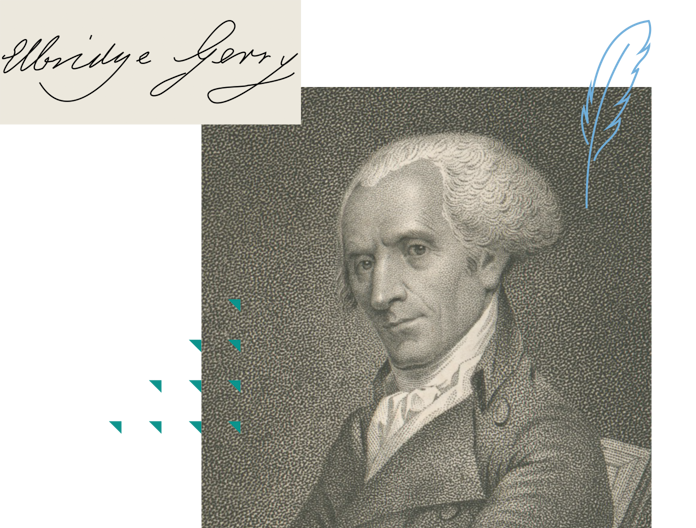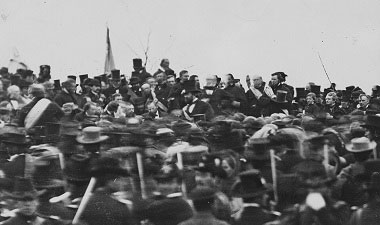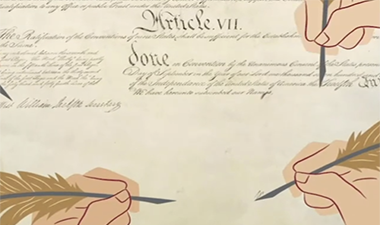Summary
Elbridge Gerry urged delegates to sign the Declaration and took a leading role in supplying the Continental Army. Gerry declined to sign the Constitution as a delegate and briefly served as vice president to James Madison.
Elbridge Gerry | Signer of the Declaration | Did Not Sign the Constitution
2:47
Biography
Elbridge Gerry was born in Marblehead, Massachusetts in July of 1744. His father, Thomas Gerry, was a wealthy merchant and shipper and this allowed Elbrdige to study with private tutors, and to attend Harvard College for both a bachelor and a masters degree. When he graduated in 1762 at the age of 18, he joined his family’s business. By the 1770s the Gerrys were among the colony’s wealthiest merchants.
Gerry was a shrewd businessman, but did not cut a fine figure as a gentleman. He was thin and small, with a squint in his eyes and a slight stutter in his speech. He seemed to wear a perpetual worried and dissatisfied look on his face. Men found him touchy, easily offended, stubborn, suspicious, and pessimistic but, oddly, women enjoyed his company.
Despite his stutter, Gerry decided to enter politics in 1772. He was supported in this decision by his mentor, Samuel Adams, a Bostonian who was well known for his outspoken advocacy of colonial independence. Gerry became a member of the Massachusetts legislature and served on Marblehead’s committee of correspondence which linked anti-British leaders across the colonies. He was chosen a delegate to the First Continental Congress but the death of his father led him to decline. He did, however, accept an election to the Second Continental Congress in 1776 where urged fellow delegates to sign the Declaration of Independence.
Gerry’s role in supporting independence led John Adams, also representing Massachusetts, to praise Gerry writing, “If every Man here was a Gerry, the Liberties of America would be safe against the Gates of Earth and Hell.” The two men became fast friends. James Monroe also befriended Gerry, but few of his other peers formed close relationships with Gerry, for though admittedly brilliant and often persuasive, his stubborn insistence on the correctness of his own views –which were erratic and unpredictable--would make him decidedly unpopular in the halls of government. Fellow congressman, Charles Thompson, summed up their frustration with Gerry when he declared that Gerry’s “pleasure seems proportioned to the absurdity of his schemes.”
During the revolution, Elbridge Gerry took a leading role in supplying the Continental Army. He used European business connections to acquire military supplies and he financed privateering operations against British shipping. Due to his repeated calls in the Continental Congress for better pay and equipment for enlisted men, Gerry gained the nickname “soldiers’ friend.” In 1780, Gerry left Congress because of a disagreement over the price schedule for suppliers like himself. Yet he profited so richly from supplying the military, that he was able to retire from business and invest his money in land.
For three years after abandoning his seat in the Continental Congress, Gerry was absent from politics. At last, in 1783, the state legislature persuaded him to return to the Congress while it was meeting in New York City. Here he met and married Ann Thompson, twenty years his junior and the daughter of a wealthy New York merchant.
In 1787 Gerry agreed to serve with Nathaniel Gorham, Caleb Strong, and Rufus King as a delegate to the Constitutional Convention in Philadelphia, he managed to irritate almost every other delegate because of his unpredictable and often contradictory stances on the central issues facing the Convention. He began as a strong supporter of an empowered central government but, after arguing about the role of ordinary voters in the selection of members of the House and Senate, his ardor cooled. As Madison observed in his notes on the debate, Gerry was adamantly opposed to popular selection of the House of Representatives. With the memory of Shays’ Rebellion clearly fresh in his mind, Gerry declared that, “The evils we experience flow from the excess of democracy. The people do not want virtue, but are the dupes of pretended patriots.” Events in Massachusetts had, he readily conceded, made him less republican than before; he “had been taught by experience the danger of the leviling [sic] spirit.” Yet at the same time that he feared democracy, he was wary of the excesses of power in the proposed new government. He was especially concerned about presidential power and, although he supported George Washington to be the country’s first executive, he demanded that impeachment proceedings be spelled out in the constitution. “A good magistrate,” he argued, “will not fear them…a bad one ought to be kept in fear of them.” On these and other issues, Gerry took the floor to harangue as much as possible to persuade his fellow delegates. Altogether he rose to be recognized 153 times. In the end, although he had supported independence and the adoption of the Articles of Confederation, he joined George Mason and Edmund Randolph of Virginia in their refusal to sign the Constitution. At issue for these three men was the absence of a Bill of Rights.
Yet, by 1789, Gerry was a supporter of the new federal government, and he was elected to serve in the First House of Representatives. He knew, he told a friend, that many of his fellow representatives viewed him as an enemy of the Constitution, but he insisted that this was “remote from truth.” Instead, he declared “Since the commencement of the Revolution I have been ever solicitous for an efficient federal government.” His only caveat had been that it possessed so much power that the governed would be subject to “the rapacity and domination of lawless and insolent ambition.” He did not feel that Madison’s proposed bill of rights could provide that protection. During the debate over its adoption, Gerry repeatedly demanded that all the amendments proposed in the ratifying conventions by opponents of the Constitution be considered for inclusion in any bill of rights, especially those that aimed to severely diminish the power of the federal government. He wearied his fellow congressmen with attacks on the government’s taxing powers, and generally challenged what he saw as a Federalist plot to erode state sovereignty. In the end, the efforts by Gerry and the minority of congressmen who held Anti-Federalist positions were defeated.
Despite his Anti-Federalist stance on the Bill of Rights, Gerry took a pro-Federalist position on Alexander Hamilton’s reports on public credit. By 1792, he had opted out of further participation in Congress. He returned home to take care of his ailing wife. His next foray into politics was to serve as a presidential elector for his friend John Adams in the 1796 election. In 1797, President Adams insisted--against the advice and objections of members of his cabinet--on appointing Gerry as one of three commissioners on a delicate mission to win a new treaty of amity with France. Few people were surprised to learn that Gerry quickly alienated his fellow commissioners and pursued an independent, and unsuccessful, effort to negotiate with the French. The mission, later known as the XYZ affair, did nothing to burnish Gerry’s reputation. In fact, on his return to Massachusetts, his carriage was stoned by angry citizens and he was burned in effigy. The Federalist denunciation of Gerry led him to formally join the Democratic-Republican party.
Failures to win the governorship in four successive attempts and financial disaster marked the period from 1800 to 1810 for Gerry. But, he won the governor’s seat in 1810 and again in 1811. During these years he did his best to expel Federalists from the state government. In 1812 he supported the Republican dominated legislature’s creation of new electoral districts that would solidify their control over the state government. Gerry signed the legislation. A local Federalist newspaper pointed out that the shape of one of the new districts resembled a salamander and published a political cartoon calling the district a “Gerry-mander.” To this day, partisan redistricting is called gerrymandering.
By 1812, Gerry was out of office and in serious debt. The Republican Party came to his rescue by choosing him as James Madison’s running mate in the upcoming presidential election. Two years later, at the age of 70, Gerry’s complicated career was ended by a fatal heart attack. A correspondent to Thomas Jefferson summed up the general opinion of Gerry when he described him as “a man of sense, but a Grumbletonian. He was of service by objecting to everything he did not propose.”








